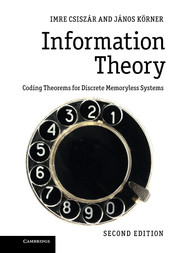Book contents
- Frontmatter
- Contents
- Preface to the first edition
- Preface to the second edition
- Basic notation and conventions
- Introduction
- Part I Information measures in simple coding problems
- Part II Two-terminal systems
- Part III Multi-terminal systems
- 13 Separate coding of correlated sources
- 14 Multiple-access channels
- 15 Entropy and image size characterization
- 16 Source and channel networks
- 17 Information-theoretic security
- References
- Name index
- Index of symbols and abbreviations
- Subject index
17 - Information-theoretic security
Published online by Cambridge University Press: 05 August 2012
- Frontmatter
- Contents
- Preface to the first edition
- Preface to the second edition
- Basic notation and conventions
- Introduction
- Part I Information measures in simple coding problems
- Part II Two-terminal systems
- Part III Multi-terminal systems
- 13 Separate coding of correlated sources
- 14 Multiple-access channels
- 15 Entropy and image size characterization
- 16 Source and channel networks
- 17 Information-theoretic security
- References
- Name index
- Index of symbols and abbreviations
- Subject index
Summary
Contemporary techniques of data security are primarily based on computational complexity, typically on the infeasibility of inverting certain functions using currently available mathematical techniques and computing power. Among the various protocols based on such ideas, those approved by the cryptography community appear secure enough, but mathematical and technological progress may render them insecure in the future. Indeed, past experience suggests that this is likely to happen.
Information-theoretic secrecy offers provable security even against an adversary with unlimited computing power. This chapter provides a glimpse into the substantial progress that has been made towards clarifying the theoretical possibilities in this direction. Practical applications are reasonably expected within a much shorter time than capacity-achieving coding techniques have followed Shannon's discovery of the noisy channel coding theorem.
Two kinds of problems will be addressed: secure transmission over insecure channels and secret key generation taking advantage of public communication. After introducing necessary concepts and tools in Section 17.1, these problems will be treated in Sections 17.2 and 17.3. Let us emphasize that the mathematical models and techniques will be similar to those in previous chapters. These models, however, are now studied from a non-cooperative aspect: a major goal is to keep (at least) one party ignorant of (at least part of) the information exchanged.
Information
- Type
- Chapter
- Information
- Information TheoryCoding Theorems for Discrete Memoryless Systems, pp. 400 - 460Publisher: Cambridge University PressPrint publication year: 2011
Accessibility standard: Unknown
Why this information is here
This section outlines the accessibility features of this content - including support for screen readers, full keyboard navigation and high-contrast display options. This may not be relevant for you.Accessibility Information
- 2
- Cited by
